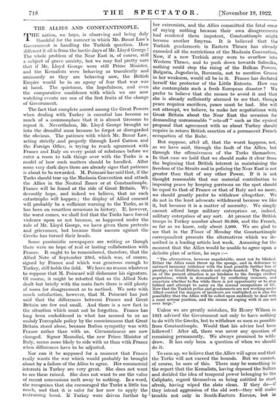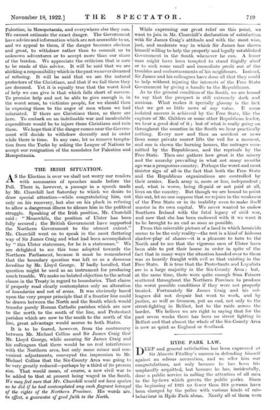THE ALLIES AND CONSTANTINOPLE. T HE nation, we hope, is observing
and being duly thankful for the manner in which Mr. Bonar Law's Government is handling the Turkish question. How different it all is from the hectic days of Mr. Lloyd George ! The whole problem of the Near East is, of course, still a subject of grave anxiety, but we may feel pretty sure that if Mr. Lloyd George were still Prime Minister, and the Kemalists were behaving as truculently and ominously as they are behaving now, the British Empire would be in an agony of fear that war was at hand. The quietness, the hopefulness, and even the comparative confidence with which we are now watching events are one of the first fruits of the change of Government.
The fact that complete accord among the Great Powers when dealing with Turkey is essential has become so much of a commonplace that it is almost tiresome to repeat it. Nevertheless, Mr. Lloyd George brought us into the dreadful mess because he forgot or disregarded the obvious. The patience with which Mr. Bonar Law, acting strictly .and properly through Lord Curzon and the Foreign Office, is trying to reach agreement with France and Italy on every point of substance before we enter a room to talk things over with the Turks is a model of how such matters should be handled. After some very dark days there are already signs that patience is about to be rewarded. M. Poincare has said that, if the Turks should tear up the Mudania Convention and attack the Allies in the Neutral Zones or at Constantinople, France will be found at the side of Great Britain. We devoutly hope, and indeed we believe, that no such catastrophe will happen ; the display of Allied concord will probably be a sufficient warning to the Turks, as it has been on countless occasions in history. If, however, the worst comes, we shall feel that the Turks have forced violence upon us not because, as happened under the rule of Mr. Lloyd George, we have given them pretexts and grievances, but because their success against the • • Greeks has turned their heads.
Some pessimistic newspapers are writing as though there were no hope of real or lasting collaboration with France. It ought to be remembered, therefore, that the Allied Note of September 23rd, which was, of course, signed by France and which was generous enough to Turkey, still holds the field. We have no reason whatever to suppose that M. Poincare will dishonour his signature. Of course, it might be retorted that as the Allied Note dealt but briefly with the main facts there is still plenty of room for disagreement as to method. We note with much satisfaction, however, that M. Poincare has just said that the differences betweeii France and Great Britain are few and small. And there is a new fact in the situation which must not be forgotten. France has long been emboldened in what has seemed to us an unduly Turcophile policy by the consciousness that Great Britain stood alone, because Italian sympathy was with France rather than with us. Circumstances are now changed. Signor Mussolini, the new Prime Minister of Italy, seems more likely to side with us than with France when differences have to be adjusted.
Nor can it be supposed for a moment that France really wants the war which would probably be brought about by a failure of the Allies to agree. Her commercial interests in Turkey are very great. She does not want to see these ruined. She does not want to see the value of recent concessions melt away to nothing. In a word, she recognizes that she encouraged the Turks a little too much, and that it is safer for her now to apply the restraining hand. If Turkey were driven further by her extremists, and the Allies committed the fatal error of saying nothing because their own disagreements had rendered them impotent,. Constantinople might become another Smyrna. It is believed that the Turkish gendarmerie in Eastern Thrace has already exceeded all the restrictions of the Mudania Convention. Now, if a new Turkish army were to overflow into Western Thrace, and to push down towards Salonika, nothing could stop the rising of the Balkan Powers. Bulgaria, Jugoslavia, Rumania, not to mention Greece in her weakness, would all be in it. France has declared herself the protector of the Little Entente. How can she contemplate such a fresh European disaster ? We prefer to believe that she .means to avoid it and that she is already sufficiently alarmed to see that, though peace requires sacrifices, peace must be had. She will not attempt, we believe, to make her negotiations with Great Britain about the Near East the occasion for demanding unreasonable " sets-off " such as the cynical proposal that agreement with us about Turkey should require in return British sanction of a permanent French occupation of the Ruhr.
But suppose, after all, that the worst happens, not, as we have said, through the fault of the Allies, but through the offensiveness of the Turks themselves. In that case we hold that we should make it clear from the beginning that British interest in maintaining the freedom of the Straits and in policing the Near East is not greater than that of any other Power. If it is not thought reasonable that our material contribution to imposing peace by keeping garrisons on the spot should be equal to that of France or that of Italy and no more, we should greatly prefer to withdraw altogether. We do not in the least advocate withdrawal because we like it, but because it is a matter of necessity. We simply cannot afford large military enterprises or, indeed, military enterprises of any sort. At present the British troops in Turkey number about 30,000, and the French, so far as we know, only about 5,000. We are glad to see that in the Times of Monday the Constantinople correspondent presents the alternatives which we de- scribed in a leading article last week. Assuming for the moment that the Allies would be unable to agree upon a definite plan of action, he says :— " The alternatives, however unpalatable, must not be blinked. Either the Allies must throw up the sponge, and in deference to outward harmony withdraw with the least possible further loss of prestige, or Great Britain stands out single-handed. The dragging on of the present situation is no kindness to the foreign civilian population, which is demoralized by conflicting rumours, and uncertain whether to flee while there is yet opportunity or to stop behind and attempt to carry on the normal occupations of life. Now that the Turkish police and gendarmerie are not working under Allied control the dangers of incidents are multiplied, as is also the possibility that the Allies will be called upon suddenly to deal with a most serious position, and the means of coping with it are not over large."
Unless we are greatly mistaken, Sir Henry Wilson in 1921 advised the Government not only to have nothing to do with the Greeks, but to withdraw as soon as possible from Constantinople. Would that his advice had been followed ! After all, there was never any question of remaining permanently. We always promised to with- draw. It has only been a question of when we should do it.
To sum up, we believe that the Allies will agree and that the Turks will not exceed the bounds. But we cannot, of course, be sure of this. There may be something in the report that the Kemalists, having deposed the Sultan and derided the idea of temporal power belonging to the Caliphate, regard themselves as being entitled to start afresh, having wiped the slate clean. If they do—if they intend aggression of the old sort—they will make trouble not only in South-Eastern Europe, but in Palestine, in Mesopotamia, and everywhere else they can. We cannot estimate the exact danger. The Government have advice and information which are not accessible to us, and we appeal to them, if the danger becomes obvious and great, to withdraw rather than to commit us to unknown adventures or to accept more than our share of the burden. We appreciate the criticism that is sure to be made of this advice. It will be said that we are shirking a responsibility which in the past we never dreamed of refusing. It will be said that we are the natural protectors of the Christians, and that if we fail them they are doomed. Yet it is equally true that the worst kind of help we can give is that which falls short of success. To promise help and not be able to give enough is, in the worst sense, to victimize people, for we should then be exposing them to the anger of men whom we had infuriated. If there are Christians there, so there are here. To embark on an indefinable war and incalculable expenditure would be to injure those Christians and ruin these. We hope that if the danger comes near the Govern- ment will decide to withdraw decently and in order while there is time. In any case, let us remove tempta- tion from the Turks by asking the League of Nations to accept our resignation of the mandates for Palestine and Mesopotamia.







































 Previous page
Previous page